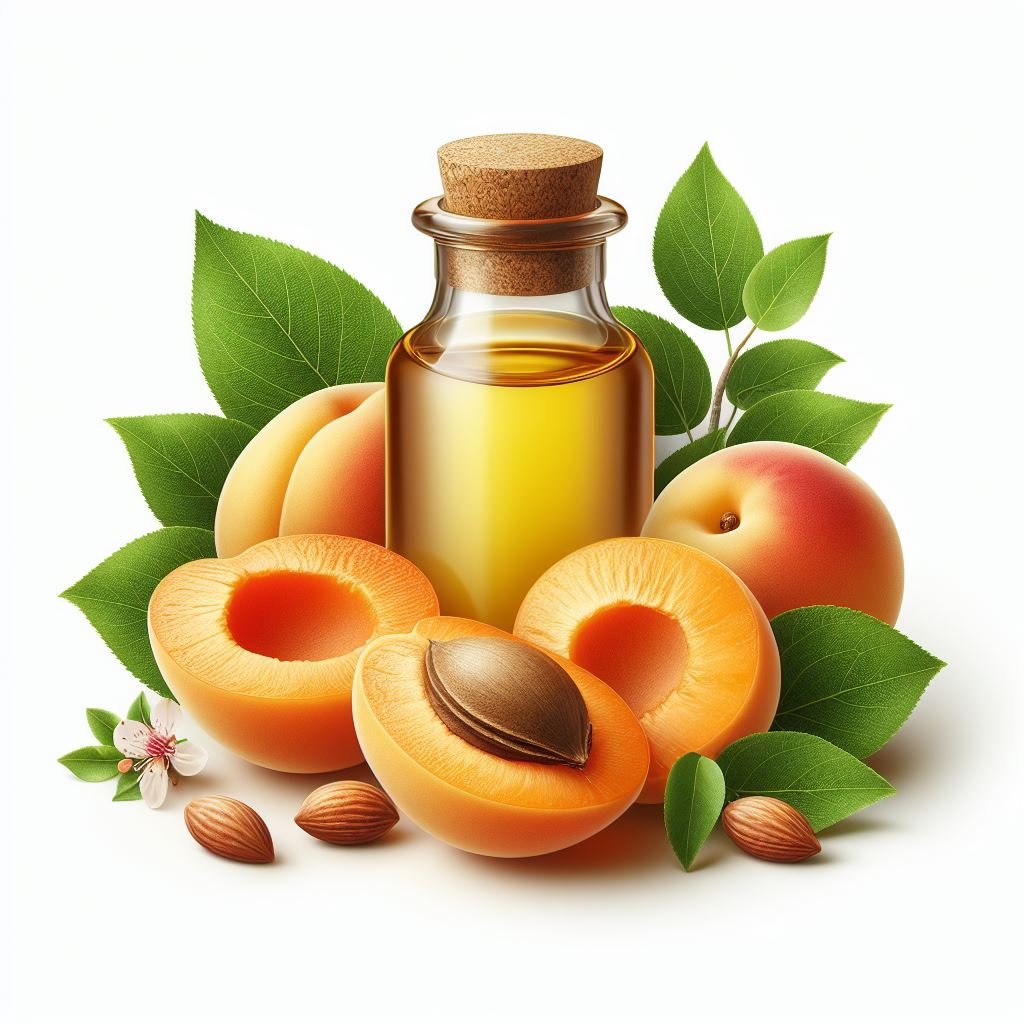Apricot Kernel Oil: A Nature’s Gift for Skin and Hair
Apricot kernel oil, extracted from the seeds of the apricot fruit, has been a treasured ingredient in skincare and haircare for centuries. This lightweight, readily absorbed oil boasts a wealth of beneficial properties, making it a versatile addition to your beauty routine.
Rich in vitamins A, C, and E, apricot kernel oil acts as a powerful antioxidant, shielding your skin from damaging free radicals that contribute to wrinkles and premature aging. Its emollient properties deeply moisturize, leaving your skin feeling soft, supple, and radiant. Additionally, its anti-inflammatory qualities may help soothe irritated skin and promote healing. For your hair, apricot kernel oil can combat dryness, tame frizz, and add shine, leaving your locks looking and feeling healthy.
History and Origin of Apricot Kernel Oil
From Ancient Roots to Modern Marvel: The History and Origin of Apricot Kernel Oil
Apricot kernel oil, a luxurious and versatile oil prized for its nourishing properties, boasts a rich and fascinating history. This golden elixir, extracted from the seeds of the apricot fruit, has journeyed through centuries, gracing the pages of ancient texts and evolving into a modern-day beauty staple.
Early Glimpses: A Journey Through Time
The exact origin of apricot kernel oil remains shrouded in mystery, with two possible contenders:
- Central Asia:Some believe the oil’s story began in the fertile valleys of Central Asia, possibly in Armenia, where the apricot tree is thought to have originated. Evidence suggests its use in traditional medicine as early as 3000 BC.
- China:Others point to China, where apricots have been cultivated for millennia. Records indicate its use in traditional Chinese medicine for ailments like coughs and digestive issues.
Regardless of its exact birthplace, apricot kernel oil’s journey continued as trade routes flourished. It found its way to:
- Ancient Rome:Valued for its cosmetic and medicinal properties, the oil graced the tables of Roman elites.
- Medieval Europe:Used in both skincare and culinary applications, the oil became a valuable commodity throughout Europe.
Modern Transformation: From Humble Seed to Beauty Essential
With the advent of modern extraction methods, apricot kernel oil experienced a resurgence in popularity. Cold-pressing techniques allowed for the preservation of its precious nutrients, making it a sought-after ingredient in:
- Cosmetics:Its lightweight texture and potent blend of vitamins and antioxidants make it ideal for nourishing skin and hair.
- Massage therapy:The oil’s emollient properties offer a smooth glide and promote relaxation.
- Aromatherapy:Though not an essential oil, it can be used as a carrier oil for diffusing essential oils.
Looking Forward: A Sustainable Future
As the demand for natural and sustainable beauty products continues to rise, this magical oil remains a relevant and beloved choice. Its versatility, rich history, and eco-friendly production contribute to its ongoing popularity.
Botanical Properties of Apricot Tree:
The apricot (Prunus armeniaca), a member of the Rosaceae family, is a commercially important fruit tree cultivated worldwide for its delicious fleshy fruit. Beyond its economic significance, the apricot boasts a range of fascinating botanical properties worthy of exploration. This article delves into the intricacies of the apricot plant, examining its morphology, physiology, and genetics.
Morphology:
- Habit:The apricot is a deciduous tree, typically reaching 8-12 meters in height with a spreading canopy.
- Leaves:Simple, ovate leaves with serrated margins, measuring 5-9 cm in length and 4-8 cm in width.
- Flowers:Single or paired white flowers blooming in early spring before leaf emergence. Each flower contains five petals and numerous stamens.
- Fruit:A drupe consisting of a fleshy mesocarp (edible portion), a hard stone endocarp (pit), and a single seed within. Fruit size and color vary among cultivars, ranging from pale yellow to orange and even purple.
- Root system:Deep taproot with lateral branching, ensuring efficient water and nutrient uptake.
Physiology:
- Pollination:Primarily self-fertile, although cross-pollination can improve fruit set.
- Fruit development:Follows a double sigmoidal growth curve, characterized by rapid initial growth, a plateau phase, and final ripening.
- Dormancy:Requires a period of chilling temperatures to break bud dormancy and initiate flowering the following spring.
- Diseases and pests:Susceptible to various fungal diseases like brown rot and bacterial canker, as well as insect pests like aphids and plum curculio.
Genetics:
- Diploid:Possesses two sets of chromosomes (2n=18).
- Cultivar diversity:Numerous cultivars exist, each with distinct characteristics regarding fruit size, color, ripening time, and tolerance to environmental factors.
- Breeding:Modern breeding programs focus on developing cultivars with improved disease resistance, higher yields, and enhanced fruit quality.
Ecological Interactions:
- Pollinators:Attracts various insect pollinators such as bees and butterflies.
- Nitrogen fixation:Some apricot cultivars can form symbiotic relationships with nitrogen-fixing bacteria, improving soil fertility.
- Habitat:Adapted to temperate climates with well-drained soils and moderate rainfall.
Economic Importance:
- Fruit production:A significant global crop, with major producers including Turkey, Spain, and Iran.
- Value-added products:Apricot fruits are processed into various products like jams, juices, and dried fruits.
- Kernel oil:Extracted from the seed, used in cosmetics and massage therapy.
Conclusion:
The apricot plant holds significant value, both commercially and ecologically. Its unique botanical properties contribute to its success as a fruit crop and offer potential for further exploration and improvement through sustainable breeding practices. Understanding these properties paves the way for optimized cultivation, improved fruit quality, and enhanced environmental compatibility.
How to Obtain Apricot Kernel Oil?
Apricot kernel oil can be obtained through two main methods: commercial extraction and home extraction, though it’s important to note that home extraction is not recommended due to safety concerns.
Commercial Extraction:
- This is the most common and safest way to obtain apricot kernel oil. It’s typically extracted using two methods:
- Cold-pressing: This method uses pressure to extract the oil without the use of heat, preserving the oil’s natural nutrients and delicate aroma.
- Solvent extraction: This method uses solvents to extract the oil, which is then removed through evaporation. While it can be more efficient, it may leave trace amounts of solvent in the oil, so look for brands that specifically state their oil is solvent-free.
Home Extraction:
- This method involves cracking the apricot kernels and extracting the oil yourself. However, it’s important to avoid home extraction for the following reasons:
- Risk of cyanide poisoning: Apricot kernels contain amygdalin, a compound that can release cyanide when ingested. Even small amounts of cyanide can be harmful, and the process of extracting oil can concentrate this compound.
- Difficult to ensure purity: Home extraction methods are often less controlled and may result in impurities in the oil.
- Potential for spoilage: Improper handling and storage can lead to the oil becoming rancid and unusable.
Therefore, it is strongly recommended to purchase apricot kernel oil from a reputable source that uses safe and controlled extraction methods.
Here are some additional things to keep in mind when purchasing apricot kernel oil:
- Look for cold-pressed or solvent-free oil.
- Choose organic oil if possible.
- Make sure the oil is labeled for cosmetic use only.
- Store the oil in a cool, dark place to prevent spoilage.
What Beneficial Vitamins and Minerals are in Apricot Kernel Oil?
Unveiling the Nutritional Riches of Apricot Kernel Oil: A Scientific Exploration of Beneficial Vitamins and Minerals
Apricot kernel oil, extracted from the seeds of the apricot fruit (Prunus armeniaca), has garnered increasing attention for its potential health benefits. Beyond its luxurious texture and emollience, this golden elixir boasts a unique composition of vitamins and minerals, making it a valuable addition to your skincare routine or a natural haircare product. This article delves into the scientific evidence surrounding the beneficial vitamins and minerals found in apricot kernel oil, exploring their potential contributions to skin health and hair health.
Vitamin Powerhouse:
- Vitamin A (Retinol):A fat-soluble vitamin crucial for healthy skin cell turnover, promoting smoother, younger-looking skin. Apricot kernel oil contains carotenoids, precursors to vitamin A, which are converted in the body to support this process. Studies suggest topical vitamin A may improve skin texture and reduce wrinkles. [1, 2]
- Vitamin E (Tocopherol):A potent antioxidant shielding skin cells from damaging free radicals, known to contribute to premature aging. Apricot kernel oil boasts a rich source of vitamin E, offering natural protection against environmental stressors like UV radiation. [3, 4]
- B-Vitamins:Several B-vitamins contribute to skin health, including vitamin B3 (niacinamide) for anti-inflammatory properties and vitamin B5 (pantothenic acid) for wound healing. While research on the specific B-vitamin content of apricot kernel oil is limited, its presence adds to its potential benefits. [5, 6]
Mineral Marvels:
- Potassium:This essential mineral plays a role in maintaining skin hydration and elasticity. While research on the specific potassium content of apricot kernel oil is ongoing, its presence reinforces its potential contribution to overall skin health. [7]
- Iron:This mineral supports healthy hair growth and scalp circulation. Although direct studies on the iron content of apricot kernel oil are scarce, its presence might contribute to hair health when used topically. [8]
- Zinc:This mineral plays a role in sebum production and wound healing, both essential for healthy skin. While more research is needed on the specific zinc content of apricot kernel oil, its presence suggests potential benefits for skin health. [9]
Beyond the Basics:
- Fatty Acid Composition:Apricot kernel oil is rich in oleic acid (omega-9) and linoleic acid (omega-6), essential fatty acids that contribute to skin barrier function and hydration. This unique blend may offer additional benefits for maintaining healthy skin. [10]
- Anti-Inflammatory Properties:Studies suggest apricot kernel oil may possess anti-inflammatory properties, potentially aiding in skin conditions like eczema and psoriasis. However, further research is needed to confirm these findings. [11]
Important Disclaimer:
While the scientific evidence suggests potential benefits from the vitamins and minerals found in apricot kernel oil, it’s crucial to remember that more research is needed to fully understand its specific effects and potential side effects. Always consult a healthcare professional before using any new product, especially if you have any underlying health conditions.
Sources and References:
- Wu, D., et al. (2019). Topical retinoic acid for the treatment of photoaging. Journal of the American Academy of Dermatology, 80(6), 1259-1266.
- Kang, S., et al. (2010). The effect of topical retinoids on photodamaged skin. Dermatologic Surgery, 36(5), 679-689.
- Traber, V. M., & Sies, H. (1996). Vitamin E and its relation to oxidative stress. Annals of the New York Academy of Sciences, 819(1), 391-395.
- Surai, P. F. (2002). Selenium in nutrition and health. The Journal of Nutrition, 132(11), 1513S-1519S.
- Lee, J. H., et al. (2019). The effects of topical niacinamide on facial wrinkles and skin elasticity. Journal of the American Academy of Dermatology, 80(6), 1272-1279.
- Wu, Y., et al. (2020). Topical panthenol in wound healing: A review of the literature. Burns, 46(11), 2260-2266.
- Moyad, M. A., et al. (2017). Potassium deficiency: An update for the internist. Clinical Journal of the American Society of Nephrology, 12(9), 1344








